

Unpicking Piketty - Weekly Worker. Publishing 'sensation' Once upon a time, there was an obscure French mainstream economist who collaborated with others (Emmanuel Saez, Anthony Atkinson and Gabriel Zucman) on various studies of inequality of income and wealth in modern economies like the US.
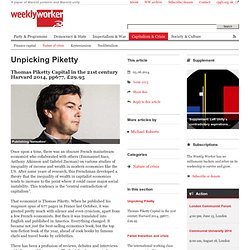
Savage capitalism is back – and it will not tame itself. Occupy Wall Street protesters in New York's Times Square.
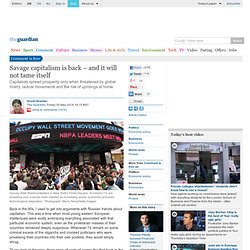
‘A miserly 1% are presiding over a social order marked by increasing social, economic and even technological stagnation.’ Photograph: Mario Tama/Getty Images Back in the 90s, I used to get into arguments with Russian friends about capitalism. This was a time when most young eastern European intellectuals were avidly embracing everything associated with that particular economic system, even as the proletarian masses of their countries remained deeply suspicious. Whenever I'd remark on some criminal excess of the oligarchs and crooked politicians who were privatising their countries into their own pockets, they would simply shrug.
Le Capital au 21ème siècle, de Thomas Piketty. Compte rendu rapide de la thèse pikettienne et de ses critiques : 1.

David Harvey Reviews Piketty's Capital in the 21st Century. David Harvey Thomas Piketty has written a book called Capital that has caused quite a stir.
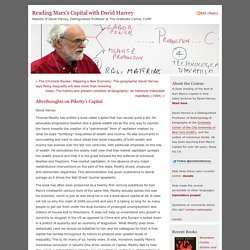
He advocates progressive taxation and a global wealth tax as the only way to counter the trend towards the creation of a “patrimonial” form of capitalism marked by what he dubs “terrifying” inequalities of wealth and income. He also documents in excruciating and hard to rebut detail how social inequality of both wealth and income has evolved over the last two centuries, with particular emphasis on the role of wealth. He demolishes the widely-held view that free market capitalism spreads the wealth around and that it is the great bulwark for the defense of individual liberties and freedoms. Free-market capitalism, in the absence of any major redistributive interventions on the part of the state, Piketty shows, produces anti-democratic oligarchies.
Capitalism and its critics: A modern Marx. WHEN the first volume of Karl Marx’s “Das Kapital” was published in 1867, it took five years to sell 1,000 copies in its original German.
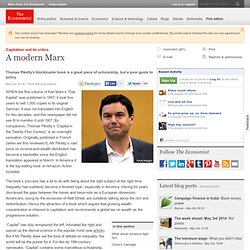
It was not translated into English for two decades, and this newspaper did not see fit to mention it until 1907. By comparison, Thomas Piketty’s “Capital in the Twenty-First Century” is an overnight sensation. Originally published in French (when we first reviewed it), Mr Piketty’s vast tome on income-and-wealth distribution has become a bestseller since the English translation appeared in March. In America it is the top-selling book on Amazon, fiction included. The book’s success has a lot to do with being about the right subject at the right time. “Capital” has duly enraptured the left, infuriated the right and spiced up the dismal science in the popular mind (see article).
J. Bradford DeLong is surprised by the poverty of conservative criticism of Capital in the Twenty-First Century. Exit from comment view mode.

Click to hide this space BERKELEY – In the online journal The Baffler, Kathleen Geier recently attempted a roundup of conservative criticism of Thomas Piketty’s new book Capital in the Twenty-First Century. The astonishing thing to me is how weak the right’s appraisal of Piketty’s arguments has turned out to be. Piketty’s argument is detailed and complicated. But five points seem particularly salient: 1. Professor Piketty Fights Orthodoxy and Attacks Inequality. Details Parent Category: Subject Areas Capital in the Twenty-First Century, by Thomas Piketty, Cambridge: The Belknap Press of Harvard University Press, 2014. $39.95.

Reviewed by Charles Andrews This book by Thomas Piketty has caused a stir, which it deserves. Capital 21, as we will abbreviate the title, grapples with a prominent current issue – outrageously unequal incomes and wealth. The concept in the title is capital, but it ties with inequality for the most page references in the index, including immediate variations. Tailored concern with inequalityHowever, Piketty's concern over inequality of income and wealth is rather tailored. Thomas Piketty and the search for ‘r’ Just about every man and woman and their dogs have reviewed French economist Thomas Piketty’s magnum opus, Capital in the 21st century.
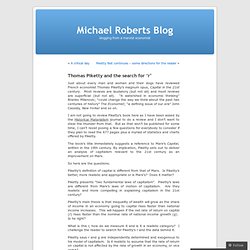
Piketty – in French it’s worse. Thomas Piketty’s now much lauded book, Capital in the 21st century, was actually published in French last summer.
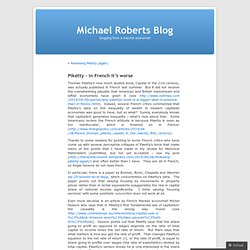
But it did not receive the overwhelming plaudits that American and British mainstream and leftist economists have given it (see Indeed, several French critics commented that Piketty’s data on the inequality of wealth in modern capitalist economies was good to have, but so what? Surely, everybody knows that capitalism generates inequality – what’s new about that. Piketty va se révéler une arme anti-marxiste encore plus efficace que Keynes. Reprendre le titre de Marx; vider le contenu de sa substance. What’s At Stake In The Tocqueville/Piketty Debate. Federal judges aren’t supposed to hear cases in which they have a financial stake.

Dozens do it anyway. When Linda Wolicki-Gables and her husband appealed a lawsuit all the way to the second-highest court in the nation against Johnson & Johnson over a malfunctioning medication pump that had been implanted in her body, the couple had no idea that one of the judges who decided their case had a financial stake in the giant multinational company. Eleventh U.S. Circuit Court of Appeals Judge James Hill owned as much as $100,000 in Johnson & Johnson stock when he and two other judges ruled against the Gables’ appeal in the precedent-setting case. For the Gables, a different decision in the 2011 appeal could have helped them win a verdict for as much as $20 million, a sum that would have vastly improved the quality of her care, according to their attorney, T.
The violations occurred even though clear rules regarding conflicts of interest exist. Yet the problems continue. William G. A world rate of profit revisited with Maito and Piketty. Back in 2012, I presented a paper to the Association of Heterodox Economists entitled, A world rate of profit (a world rate of profit). Marx’s model of capitalism and its laws of motion are based on ‘an economy’, in other words, a world economy. Of course, there are still many barriers to the establishment of a world economy and a world rate of profit from labour, trade and capital restrictions designed to preserve and protect national and regional markets from the flow of global capital.
Today’s Wonky Elite Is in Love With the Wrong French Intellectual. Thomas Piketty and his ‘Capital in the Twenty-First Century’ are white hot, but he’s no ‘Tocqueville for Today’—and he and his fan club have Tocqueville all wrong. In case you hadn’t heard, there’s a new Frenchman in town. Armed with progressives’ two favorite things—statistics and a European accent—the celebrity economist Thomas Piketty has hit American shores in support of his new book, Capital in the Twenty-First Century.
Sadly for Piketty, his explanatory socialism is a nonstarter for every American except a handful of media, academic, and policy elites. In an ominous example of just how out of touch those elites have become, two of them have produced a wildly mistaken assessment of Piketty’s work—and haven’t raised so much as a peep of objection. The review in question is “A Tocqueville for Today,” written by Jacob S. Hacker and Pierson are respected scholars in their field. Tocqueville, not Piketty, is our best guide to the problem of inequality in America.
So far, so good. No. Piketty's Tax Hikes Won't Help the Middle Class. My review of Megan McArdle’s review of Capital In the 21st Century. I apologize in advance, because I am going to talk about a piece that I have not yet read. To be clear, I do not intend to read Megan McArdle’s “Piketty’s Tax Hikes Won’t Help the Middle Class.” I’m afraid that I can’t wait to weigh in — not on the review itself, but on its topic. How much doesn’t inequality not actually not matter? My first objection is to McArdle’s central argument, “Taxes are gay.” I find this offensive and wrongheaded. Second, I find McArdle’s review, which I believe concerns Lemony Snicket’s The Capitals In the 21st Century, to be filled with distortions and misreading. I also find it unpersuasive when McArdle writes about the plight of the working poor. Contradictions of Capitalism: In Conversation with David Harvey. Piketty, un marxisme de sous-préfecture.
Karl Marx, dans Le 18 Brumaire de Louis Bonaparte, souligne que "tous les grands événements et personnages historiques se répètent pour ainsi dire deux fois : la première fois comme tragédie ; la seconde fois comme farce". Il peut en aller de même des livres d'économie. Le capital, qui constitue le coeur de l'oeuvre de Marx, est une extraordinaire tentative d'économie totale qui prétend intégrer le développement historique et l'avenir avec la perspective de la révolution et de la société sans classe. Thomas Piketty a choisi de se placer sous l'ombre portée de ce géant, en plaçant l'accumulation illimitée du capital au centre de sa réflexion.
Il revendique une économie politique globale ouverte sur les sciences sociales, notamment sur l'histoire et la démographie, n'hésitant pas à intégrer des références - au demeurant passionnantes - à la littérature et au cinéma. Chez Piketty comme chez Marx, les démonstrations du savant sont souvent éclipsées par les passions de l'idéologue. Kapital for the Twenty-First Century? Originally published by Dissent Full Disclosure: The Institute for New Economic Thinking has extensively supported the the World Top Incomes Database on which the book under review draws extensively.
Capital in the Twenty-First Century by Thomas Piketty, trans. Arthur Goldhammer Belknap Press, 2014, 671 pp. The big economic debate of the 21st C has just been launched – and it’s about power rather than money. Six years after the Wall Street Crash, a book was published that revolutionised economic thinking and set the tone for policy for decades to come. That book was, of course, The General Theory written by John Maynard Keynes. Has history just repeated itself? Thomas Pikkety’s book Capital in the Twenty-first Century* has beaten Keynes’s record appearing five years and six months after the 2008 Crash.
Nevertheless, it does look set to create just as much debate. Whether it will recast policy in the same way is less certain but, if there is any justice, it should although maybe not in the way Pikkety himself suggests. This ‘ridiculously far-left’ economist is candy for liberals. The No. 1 bestselling book on Amazon last week wasn’t about plucky teen girls battling for humanity in a futuristic dystopia.